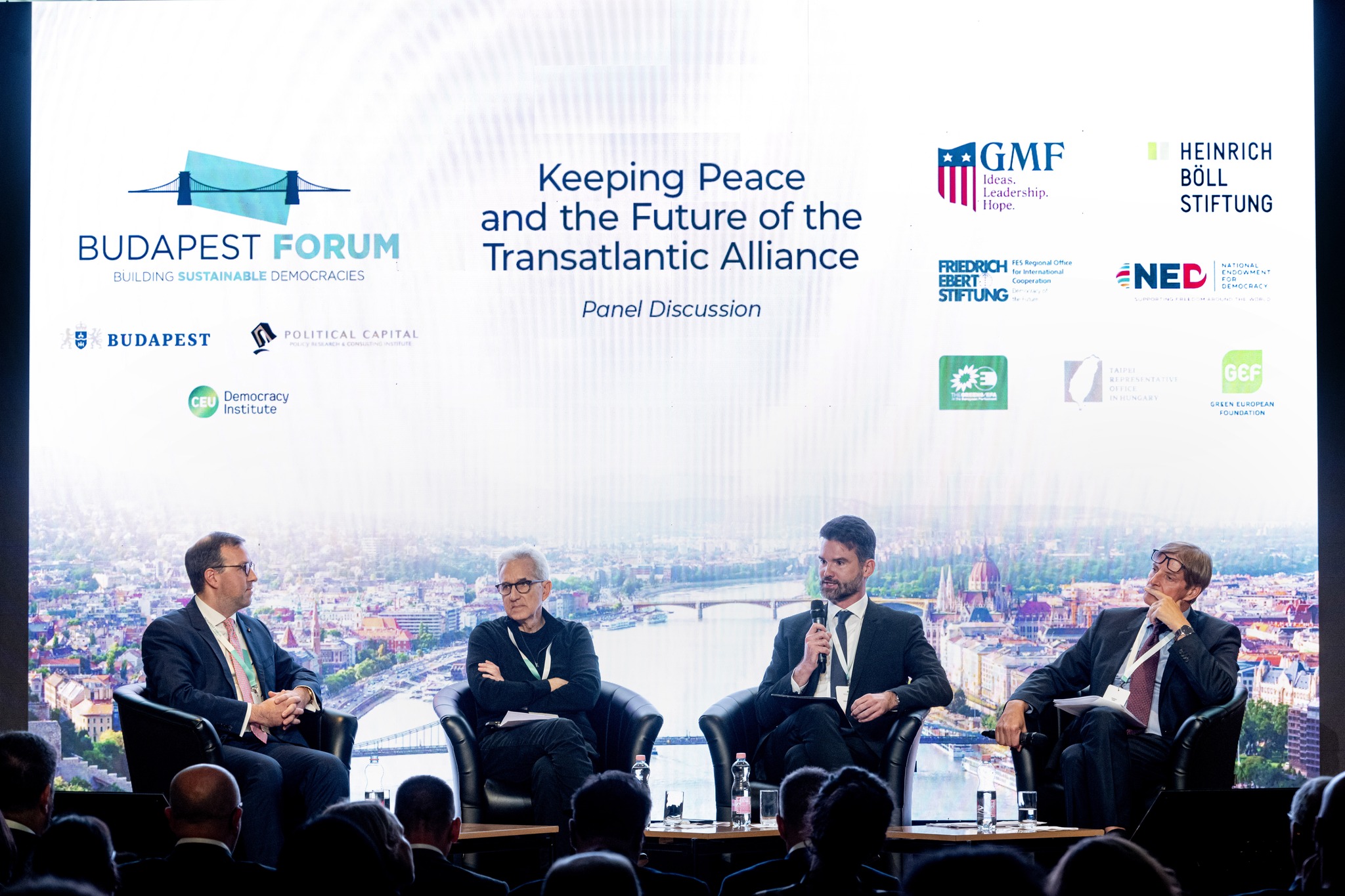Budapest Forum 2023 - Keeping Peace and the Future of the Transatlantic Alliance
2023-10-19
Budapest Forum 2023: Keeping Peace and the Future of the Transatlantic Alliance
Speakers
- Jeffrey Gedmin, Co-founder and Editor-in-Chief, American Purpose; Acting President, Radio Free Europe/Radio Liberty in Prague
- Petr Luňák, Deputy Head, Engagement Section, NATO Public Diplomacy Division
- Gladden Pappin, President, Hungarian Institute of International Affairs
- Réka Szemerkényi, Senior Advisor on Transatlantic Strategy, International Republican Institute
Moderator: Dániel Hegedűs, Senior Fellow, GMFUS

Main takeaways
- The panelists stressed that one of the most substantial prerequisites for re-establishing a stable and lasting peace on the continent is strategic thinking that has to come back to Europe. The second important prerequisite is to refocus on the transatlantic cooperation.
- It would be very important to understand the real rationale of the war: a lot of it is linked to Russia's seeing itself, and positioning itself in the 21st century.
- Because Russia has not been respecting most of the international agreements, whichis signed by the country, it is very difficult to expect any agreement in the future that would be respected, would have any credibility for the other partners. On the other hand, any changes in Russia are dependent on the Russian people themselves.
- Réka Szemerekényi argues that thinking from Ukraine's perspective, this war strategically has been won already: Ukraine has maintained its strategic presence and its sovereignty. Kyiv is in charge of the country and it has maintained access to the Black Sea and Odessa and is not even under challenge now. Now they have to find a way to stop the fighting.
- Jeffrey Gedmin argued that Europeans see themselves as bystanders, passively watching what is next and how to react to what happens in the United States but it is very important for Europe to have agency to affect in any way possible the outcome of the war in Ukraine. Gedmin suggested that Europe does what it can to do to influence or debate and help Ukraine because if the endgame is one more frozen conflict, then Russia will reset and start again in the future.
- Gladden Peppin highlighted that Hungary has basically played the role of „a voice crying in the wilderness” since the beginning of the war. The result of that is that the Hungarian position with regard to the war is often controversial but it seems that the Hungarian position is kind of accepted quietly 6 to 8 months later. At the beginning of this year, the Hungarian government was saying that now is the time to have a ceasefire and that there is no military solution on the battlefield. Hungary has a very realistic approach to its analysis and a very realistic presentation of its judgements that often cause controversy.
- The limits of European unity and determination related to Ukraine can be seen (eg. Turkish-Hungarian blockade of Sweden's NATO accession; Polish-Slovak-Hungarian blockade of Ukrainian grain export, etc.) but the NATO countries tied their geopolitical future to the success of Ukraine.
- Petr Luňák argued that Russia has been defeated strategically, Russia failed to deliver to achieve its goals, which are the goals of its aggression. In fact, the question really is to ensure Ukraine's victory, which is not necessarily the same thing.
- It is not up to us to define what Ukraine's victory means. It is actually up to Ukraine and Ukraine alone to define that.
Policy recommendation
- Europe has to relearn to think strategically not just in economic and political terms and not even just in defence and military terms, but in a very distinctly strategic manner to approach the global developments and the developments that are taking place in the continent.
- In the European framework, the priorities have to reshift and give an increased focus on strategic elements of cooperation, keep the economic elements obviously strong and foundational, which will enable Europe to be a real partner of the United States and to be a real player in the transatlantic framework.
- There should be European re-industrialisation, and there should be strong European defence.
- Hungary has to start a more systematically cooperative language in the bilateral relationship with Ukraine.
Copyright 2025. Political Capital Policy Research and Consulting Institute, all rights reserved.

